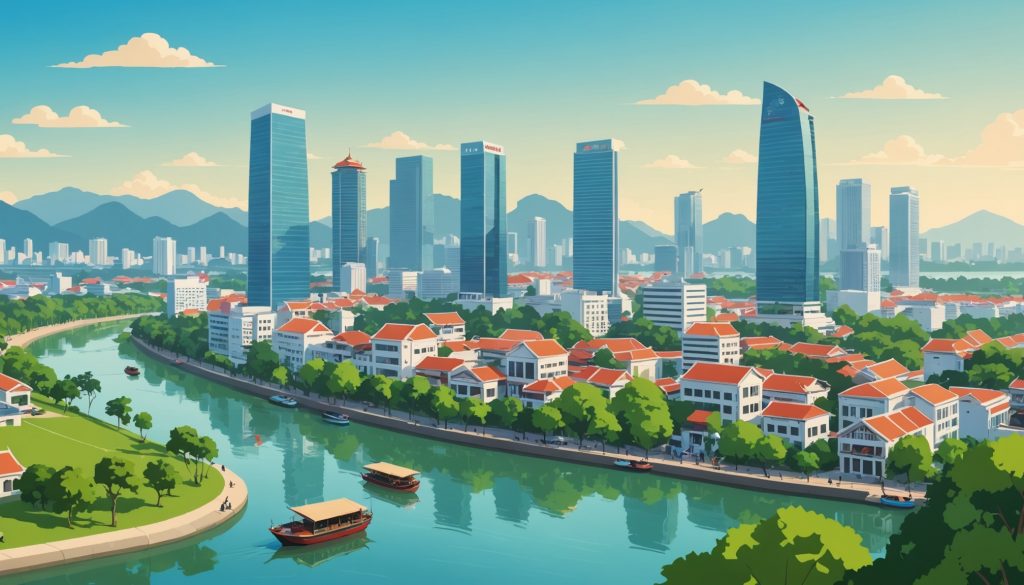Real Estate Investment Opportunities in Vietnam: A Comprehensive Guide for 2025
Estimated Reading Time: 7 minutes
Key Takeaways
- Foreign Ownership: Allowed with restrictions on land ownership.
- Legal Transparency: Improving due to recent reforms.
- Market Liquidity: High in urban centers.
- Expected ROI: Positive growth in both capital gains and rental yields.
- Risks: Include market volatility and regulatory changes.
- Financing Options: Includes local mortgages and equity investment.
Table of Contents
- Market Overview
- Investment Trends & ROI Projections
- Legal & Tax Considerations
- Property Types & Prices
- Risks & Challenges
- Financing & Mortgage Options
- Citizenship/Residency Benefits
- Key Takeaways
- FAQs
Market Overview
Vietnam’s real estate market is on a positive trajectory, driven by several macroeconomic factors:
- Urbanization and Population Growth: Rapid urbanization, particularly in cities like Hanoi, Ho Chi Minh City, and Da Nang, is creating heightened demand for residential and commercial properties.
- Infrastructure Investment: Increased public and private funding in transport and utilities is making suburban areas more appealing for large developments.
- Economic Momentum: A growing GDP and rising foreign direct investment (FDI) are strong indicators for sustained real estate demand, especially in the industrial sector.
- Two-Tier Market: Major cities are witnessing price inflation while other regions display steadier growth, offering varying investment opportunities.
Investment Trends & ROI Projections
Investment dynamics in Vietnam’s real estate market suggest promising returns:
- Projected ROI: In 2025, capital gains are expected to climb due to limited supply and strong demand. In major cities, prices for primary apartments may exceed VND 79 million per square meter.
- Rental Yields: Gross rental yields in sought-after areas typically lie between 5% and 8%, driven primarily by expatriate demand and a burgeoning middle class.
- Market Volatility: While stability is increasing, investors must remain aware of potential risks like policy changes and speculative bubbles.
Legal & Tax Considerations
Understanding the legal framework is essential for foreign investors:
- Land Ownership: Foreign ownership of land is restricted; however, foreigners can own up to 30% of an apartment building and 350 housing units per administrative ward.
- Legal Reforms: The 2024 laws governing real estate enhance transparency and investor security.
- Tax Liabilities: Taxation includes property tax, transaction taxes (typically at 10% VAT), and corporate income tax, impacting overall returns.
Property Types & Prices
The market offers diverse property types:
| Feature | Hanoi/Ho Chi Minh City | Secondary Cities (e.g., Da Nang) |
|---|---|---|
| Price per m² (Primary) | High (VND 79M+) | Moderate |
| Liquidity | High | Moderate |
| Rental Demand | Strong | Growing |
| Market Stability | Improving | Evolving |
Risks & Challenges
Investors should recognize factors that could impact their investments:
- Policy Risks: Sudden changes in regulation could alter the investment landscape.
- Currency Fluctuation: The Vietnamese dong’s volatility may affect returns for foreign investors.
- Infrastructure Delays: While improving, there remain risks associated with project timelines and execution.
Financing & Mortgage Options
Foreign investors may access various funding sources:
- Banks: Local institutions offer mortgages, though terms may be restrictive.
- Alternative Financing: Many investors opt for equity or offshore financing as alternatives to traditional mortgages.
Citizenship/Residency Benefits
Thus far, property ownership does not guarantee residency or citizenship:
- Visa Options: Investors may qualify for long-term visas through business activities but must navigate the legal landscape to maximize benefits.
Key Takeaways
- Foreign ownership is allowed with restrictions on land ownership.
- Legal transparency is improving due to recent reforms.
- Market liquidity is high in urban centers.
- Positive growth is expected in both capital gains and rental yields.
- Include risks such as market volatility and regulatory changes.
- Financing options include local mortgages and equity investment.
FAQs
- 1. What types of properties can foreigners invest in?
- Foreigners can invest in apartments and houses but cannot own land.
- 2. Are there any taxes on real estate transactions?
- Yes, property taxes, VAT, and corporate income taxes apply to foreign investors.
- 3. What is the expected rental yield in major cities?
- Gross rental yields range from 5% to 8% in urban areas.
- 4. Can property ownership lead to residency?
- No, Vietnam does not provide residency or citizenship through property investment alone.
In conclusion, Vietnam is poised to be an attractive destination for real estate investment by 2025, characterized by a blend of economic growth, legal advancements, and strong demand dynamics. Investors interested in tapping into this burgeoning market should prioritize risk management, local partnerships, and comprehensive due diligence.
For more insights and expert guidance on investing in Vietnam, visit Realty Invest Navigator.

